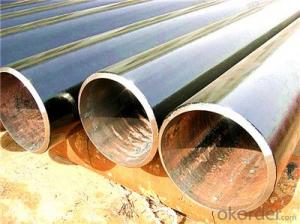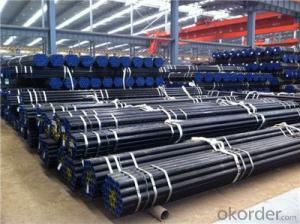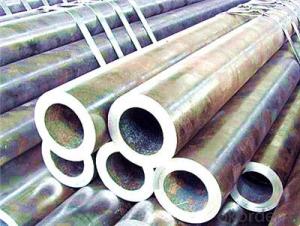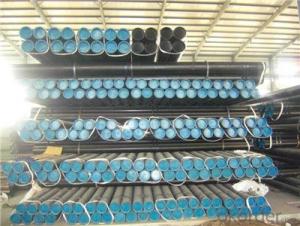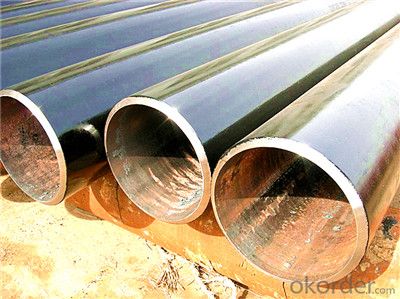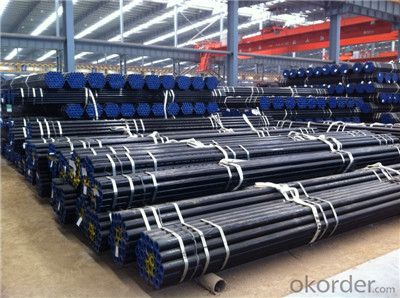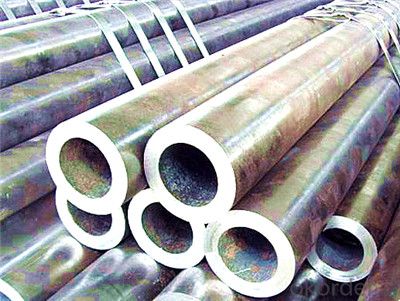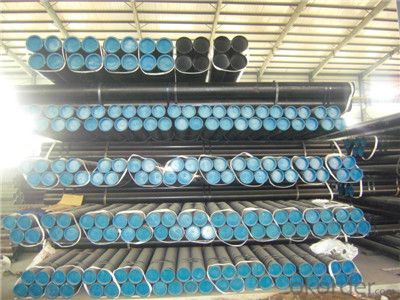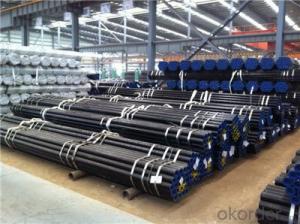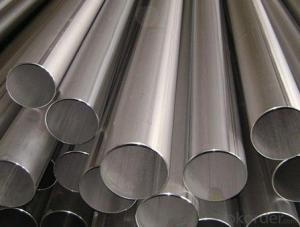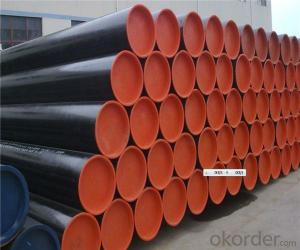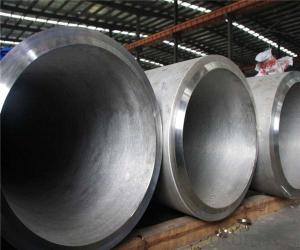CNBM seamless steel pipe hot selling with high quality
- Loading Port:
- Tianjin
- Payment Terms:
- TT OR LC
- Min Order Qty:
- 50 m
- Supply Capability:
- 200000 m/month
OKorder Service Pledge
OKorder Financial Service
You Might Also Like
PRODUCT DETAILS
1.Structure of Seamless Steel Pipe Description:
A large amount of Seamless Steel Pipes is offered to the clients at cost effective rates. These pipes are extremely durable, resistant to corrosion and have high tensile strength. Our pipes are used in nuclear plants, power plants, refineries and construction industry across the country. Furthermore, we are capable of providing these seamless pipes to the clients in bulk quantity.
2.Main Features of the Steel Pipe:
• High manufacturing accuracy
• High strength
• Small inertia resistance
• Strong heat dissipation ability
• Good visual effect
•Reasonable price
3.Packaging & Delivery:
| Packaging Details: | Seaworthy packages, bundles wrapped with strong steel strip |
| Delivery Detail: | 15-30 days after received 30% TT |
4.Seamless Steel Pipe Specification:
| Standard: | GB, DIN, ASTM,ASME, ASTM A106-2006, ASTM A53-2007 |
| Grade: | 10#,20#, 45#, 16Mn |
Thickness: | 8 - 33 mm |
| Section Shape: | Round |
| Outer Diameter: | 133 - 219 mm |
| Place of Origin: | Shandong, China (Mainland) |
| Secondary Or Not: | Non-secondary |
| Application: | Hydraulic Pipe |
| Technique: | Cold Drawn |
| Certification: | API |
| Surface Treatment: | factory state or painted black |
| Special Pipe: | API Pipe |
| Alloy Or Not: | Non-alloy |
| Length: | 5-12M |
| Outer Diameter: | 21.3-610mm |
5.Product pictures
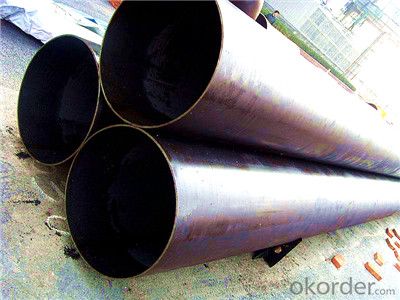
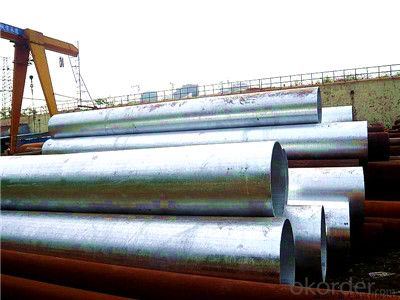
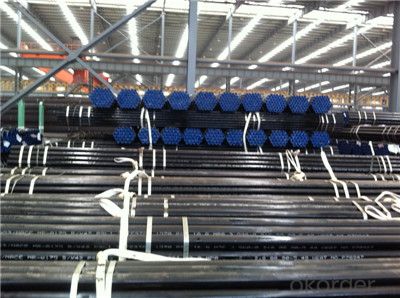
6.FAQ of Seamless steel pipe:
①How is the quality of your products?
Our products are manufactured strictly according to national and internaional standard, and we take a test
on every pipe before delivered out. If you want see our quality certifications and all kinds of testing report, please just ask us for it.
Guaranteed: If products’ quality don’t accord to discription as we give or the promise before you place order, we promise 100% refund.
②How about price?
Yes, we are factory and be able to give you lowest price below market one, and we have a policy that “ for saving time and absolutely honest business attitude, we quote as lowest as possible for any customer, and discount can be given according to quantity”,if you like bargain and factory price is not low enough as you think, just don’t waste your time.Please trust the quotation we would give you, it is professional one.
③Why should you chose us?
Chose happens because of quality, then price, We can give you both.Additionally, we can also offer professional products inquiry, products knowledge train(for agents), smooth goods delivery, exellent customer solution proposals.Our service formula: good quality+good price+good service=customer’s trust.
SGS test is available, customer inspection before shipping is welcome, third party inspection is no problem.
Any question, pls feel free to contact us !
- Q: What is the difference between steel pipes and PVC-M pipes?
- Steel pipes are made from a strong and durable material, steel, and are commonly used for carrying high-pressure fluids or in industrial applications. On the other hand, PVC-M pipes are made of a plastic material called polyvinyl chloride modified, which offers good flexibility and resistance to corrosion. PVC-M pipes are typically used in low-pressure applications such as domestic plumbing, irrigation, or drainage systems.
- Q: Can steel pipes be used for conveying chemicals?
- Steel pipes are capable of conveying chemicals. Steel, being a robust and long-lasting material, can endure high pressure and temperature conditions. This makes it suitable for the transportation of diverse chemicals. Moreover, steel pipes possess exceptional resistance against corrosion, which is particularly crucial when handling corrosive substances. They find common usage in industries such as oil and gas, chemical processing, and water treatment, where the secure and efficient conveyance of chemicals is indispensable. However, it is essential to consider the specific requirements of the chemical being transported and ensure compatibility with the steel pipe. It may be necessary to select the appropriate material, including the utilization of corrosion-resistant coatings or linings, to prevent any adverse reactions between the chemicals and the steel pipe.
- Q: What are the factors that affect the pressure rating of steel pipes?
- There are several factors that can affect the pressure rating of steel pipes. These include the material and grade of the steel used, the wall thickness of the pipe, the diameter of the pipe, the temperature at which the pipe will be operating, and the type of fluid or gas being transported through the pipe. Additionally, factors such as corrosion, external loads, and installation methods can also impact the pressure rating of steel pipes.
- Q: Can steel pipes be used for conveying compressed air?
- Yes, steel pipes can be used for conveying compressed air. Steel pipes are commonly used in applications where high pressure and durability are required, such as in industrial settings. Steel pipes have a high tensile strength and can withstand the high pressures generated by compressed air systems. Additionally, steel pipes are resistant to corrosion, which is important when dealing with moisture in compressed air. However, it is important to ensure that the steel pipes are properly sized and rated for the specific pressure and flow requirements of the compressed air system. Additionally, proper installation and maintenance practices should be followed to prevent any potential leaks or failures.
- Q: What are the common methods for repairing steel pipes?
- There are several common methods for repairing steel pipes, depending on the nature and extent of the damage. One common method is welding, which involves melting the damaged area and fusing it with a new piece of steel. This method is often used for small cracks or holes in the pipe. Welding can be done using various techniques such as shielded metal arc welding (SMAW), gas metal arc welding (GMAW), or tungsten inert gas (TIG) welding. Another method is pipe wrapping or bandaging, which involves wrapping a layer of adhesive tape or resin-soaked fiberglass around the damaged section of the pipe. This method is suitable for small leaks or corrosion spots and provides a temporary fix until a more permanent solution can be implemented. If the damage is extensive or the pipe is severely corroded, pipe lining or relining may be necessary. This involves inserting a new pipe liner inside the existing one, effectively creating a new pipe within the old one. This method can be done using various materials such as epoxy, polyethylene, or cured-in-place pipe (CIPP). Pipe lining is commonly used for larger diameter pipes or when replacement is not feasible. In some cases, pipe clamps or sleeves can be employed to repair minor leaks or cracks. These devices are designed to be clamped around the damaged section and provide a temporary or permanent solution depending on the severity of the damage. Ultimately, the choice of repair method depends on factors such as the extent of damage, accessibility of the damaged area, budget constraints, and the long-term durability required. It is advisable to consult with a professional pipe repair specialist to assess the specific situation and determine the most suitable method for repairing steel pipes.
- Q: Are steel pipes suitable for use in hydropower plants?
- Yes, steel pipes are suitable for use in hydropower plants. Steel pipes are known for their durability, strength, and longevity, making them ideal for withstanding the high pressures and transporting fluids in hydropower plants. Additionally, steel pipes can effectively handle the flow of water and resist corrosion, making them a reliable choice for hydropower plant applications.
- Q: Are steel pipes suitable for use in pharmaceutical industries?
- Yes, steel pipes are suitable for use in pharmaceutical industries. Steel pipes are known for their durability, strength, and resistance to corrosion, making them ideal for transporting various pharmaceutical materials and fluids safely and hygienically. Additionally, steel pipes can withstand high pressure and temperature conditions, ensuring the integrity and efficiency of pharmaceutical manufacturing processes.
- Q: What are the common methods for inspecting the integrity of steel pipes?
- To inspect the integrity of steel pipes, various methods are employed. These methods play a vital role in identifying any faults or weaknesses in the pipes that could jeopardize their structural soundness and potentially result in failures or leaks. 1. Visual Inspection: This method involves a visual examination of the external surface of the steel pipe by an inspector. The purpose is to spot any signs of damage, such as corrosion, cracks, or deformities. Although it is a quick and cost-effective approach, it may not be sufficient to detect internal defects. 2. Ultrasonic Testing (UT): UT is a non-destructive testing method that utilizes high-frequency sound waves to identify flaws in steel pipes. A transducer emits ultrasonic waves into the pipe, and any waves that bounce back are analyzed to detect defects like cracks or voids. UT is effective for inspecting both the internal and external aspects of the pipe and can provide precise measurements of defect size and location. 3. Magnetic Particle Inspection (MPI): MPI is primarily employed to detect surface or nearby surface defects in ferromagnetic materials like steel. Magnetic particles are applied to the pipe's surface, and if there is a defect, these particles will gather around it, creating a visible indication. MPI is particularly useful in identifying cracks and other discontinuities that may not be easily visible to the naked eye. 4. Radiographic Testing (RT): RT involves the use of X-rays or gamma rays to examine the internal structure of steel pipes. These rays pass through the material, and an image is recorded on a radiographic film or a digital detector. This method is effective in detecting internal defects such as cracks, voids, or inclusions. However, it necessitates proper safety measures due to the use of radiation. 5. Eddy Current Testing (ECT): ECT is a non-destructive testing method that relies on electromagnetic induction to assess the integrity of steel pipes. An alternating current is passed through a probe, generating an electromagnetic field. Any alterations in the material's electrical conductivity or magnetic permeability caused by defects are detected by the probe, providing information about the pipe's condition. These represent some of the commonly used techniques for inspecting the integrity of steel pipes. Each method possesses its own advantages and limitations, and the choice of inspection method depends on factors such as the type of defect to be identified, access to the pipe, and budgetary considerations. Regular inspection and maintenance using these methods are crucial to ensure the secure and dependable operation of steel pipe systems.
- Q: What kind of argon arc welding wire is used for 16Mn steel pipe?
- 16Mn steel belongs to carbon manganese steel, the content of carbon is about 0.16%, and the yield point is equal to 343MPa (strength grade is 343MPa). 16Mn steel alloy content is less, good weldability, welding generally without preheating. But because the 16Mn steel hardened tendency is slightly larger than the low carbon steel, so at low temperatures (such as winter outdoor operations) or welding in high rigidity, large thickness of the structure, in order to prevent the cold crack, need to take measures to preheat.
- Q: How seamless steel tube is formed?
- Hot drawing or cold drawing. The so-called cold is the billet from the thick wall tube is not heated, oil lubrication, with a steel sleeve inside, gradually elongated. Hot drawing is to make the billet tube red, do such work, generally thick wall applicable.
Send your message to us
CNBM seamless steel pipe hot selling with high quality
- Loading Port:
- Tianjin
- Payment Terms:
- TT OR LC
- Min Order Qty:
- 50 m
- Supply Capability:
- 200000 m/month
OKorder Service Pledge
OKorder Financial Service
Similar products
Hot products
Hot Searches
Related keywords
